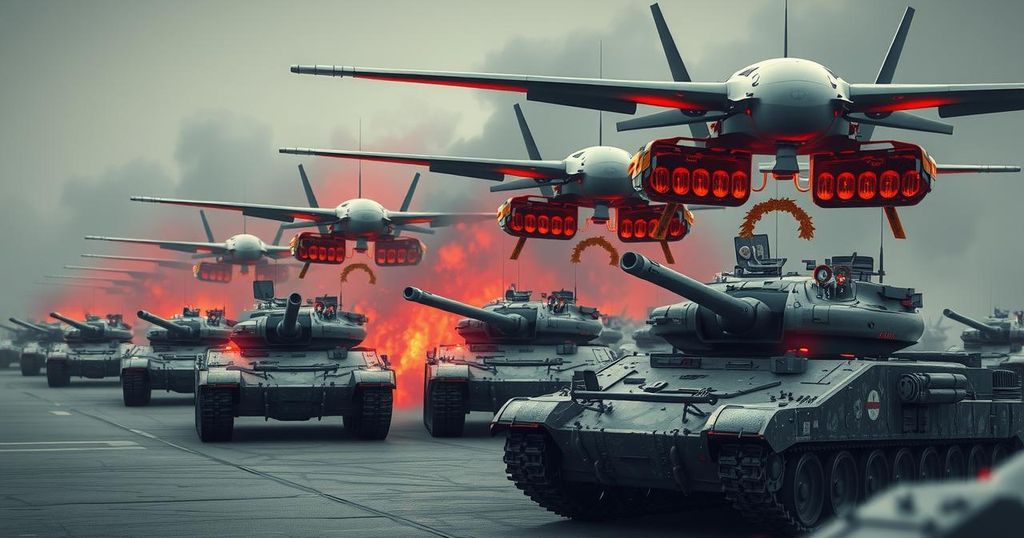World news
AFRICA, ANDREW NEIL, BIDEN ADMINISTRATION, CUBA, ENERGY INFRASTRUCTURE, EUROPE, EUROPE/ASIA, GEOPOLITICS, INTERNATIONAL RELATIONS, KIM JONG UN, MOSCOW, NORTH AMERICA, PUTIN, REPUBLIC OF CONGO, RUSSIA, RUSSIA-UKRAINE WAR, SOUTH AMERICA, UKRAINE, VENEZUELA, VLADIMIR PUTIN, WAR, XI, ZIMBABWE
Daniel O'Connor
0 Comments
The Rising Threat of Autocracy: Europe’s Challenge in the Face of Global Alliances
Europe faces a rising threat from an autocratic alliance, including China, Russia, Iran, and North Korea, as exemplified by a recent gathering in Moscow. This coalition poses significant geopolitical challenges at a time when European leaders still appear naive to the growing danger. Meanwhile, discussions at the London Defence Conference highlighted the need for rearmament and robust security strategies among European nations, as complacency may lead to dire consequences.
Tensions in international politics seem increasingly real, especially with the recent gathering of notable autocrats in Moscow. On the onset of the Second World War’s end, Russian President Vladimir Putin hosted these leaders—including Belarus’s President Alexander Lukashenko, Venezuela’s Nicolás Maduro, and Cuba’s Miguel Díaz-Canel—highlighting an uncomfortable alliance looming over Europe. This event unfolded paradoxically on a day meant to celebrate liberation from tyranny, bringing together some of today’s most notable tyrants, including China’s Xi Jinping, whom Putin appears to rely on while he continues military operations in Ukraine.
In parallel to the Moscow event, the London Defence Conference occurred, focusing on the geopolitical threat posed by what is now referred to as the ‘Crinks’—the collective alliance of China, Russia, Iran, and North Korea. This gathering starkly emphasized how critical this group is for global democracy, raising alarms over the capability and determination of these autocrats and showing little awareness among European leaders.
Engagement in outright military cooperation among these nations has significantly escalated. For instance, Iran has supplied Russia with numerous drones and ballistic missiles, aiding its ongoing campaign in Ukraine. In fact, reports indicate that Iran has established drone production facilities within Russia, creating an alarming capacity for future assaults against Ukrainian cities.
Moreover, North Korea’s contributions to Russian military supplies are substantial, providing critical artillery and troops. Reports suggest that by late 2022, North Korea had dispatched thousands of containers filled with military equipment and even deployed troops to assist in regaining lost territories in Ukraine. The urgency of these actions, highlighting North Korean troops actively participating in European warfare, seems to escape the attention of many European leaders.
Meanwhile, while China has not furnished Russia with lethal arms, its economic support has been immense. Notably, China is responsible for a majority of the manufacturing tools and microchips Ukraine relies upon. Additionally, China imports significant amounts of Russian oil and gas, bolstering Russia’s economy, desperately trying to withstand global sanctions.
As this uneasy coalition strengthens, the threat to Europe intensifies. Putin’s intentions appear aggressive, with reports indicating plans for manufacturing a vastly expanded military arsenal, including tanks and armored vehicles meant for potential conflicts against Europe. This growth is alarming, particularly given the ongoing dismantling of security alliances that have protected democracy since the end of World War II.
Critics suggest that complacency among European political leaders could have dire consequences. Leaders such as Emmanuel Macron have been criticized for their inconsistent approaches to military spending. Newly appointed German Chancellor Friedrich Merz faces scrutiny amidst political uncertainty.
By contrast, Poland, the Baltic nations, and Scandinavian countries tend to have a heightened recognition of these threats given their geographical proximity. During the London Defence Conference, some speeches resonated with a reality check. For instance, Keir Starmer’s proposal to increase defense spending slightly was met with skepticism, deemed insufficient for addressing the growing power of autocratic regimes.
Many experts believe that in response to these realities, Europe must reassess its defense strategies, especially in light of the potential diminished role of the United States in global alliances. The prospect of forging independent security frameworks without reliance on the US appears vital. This could include forming coalitions among European nations and other allied nations to ensure collective security against the rising tide of autocracy.
Britain, positioned as Europe’s largest military power, could be instrumental in this newfound direction. Advocates argue that Britain must take initiative, leading defense collaborations with proactive plans rather than mere rhetoric. A serious commitment to military preparedness is essential if Europe wants to counteract the growing intimidation of the autocrat coalition, as merely talking the talk is no longer viable, given the stakes involved.
The evolving nature of international politics, highlighted by the current alliance among autocratic regimes, poses a significant threat to European security and democracy. European leaders must awaken to this peril, overcoming complacency and reinforcing collective defense strategies. There is an urgent call for serious military investments and adaptation to new global realities, as the alliance of autocrats continues to grow stronger. The path forward requires unity and effective leadership, especially from key players like Britain, to maintain security and counter these emerging threats.
Original Source: www.dailymail.co.uk




Post Comment